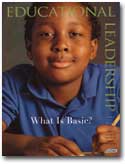Much of the debate over President Clinton's proposal for national exams has focused on issues of federalism and political control. Though Representative Bill Goodling (R-Pennsylvania) regularly reminded people that "you cannot fatten cattle by weighing them," too little discussion has centered on the tests' likely educational consequences.
The administration and the U.S. Congress compromised on national testing in 1997 by agreeing to allow item development, but not field testing or other implementation, and by agreeing to conduct several studies. The issue will return to Congress this year, first with the reauthorization of the National Assessment of Educational Progress (NAEP), and then probably in the fall, when Congress will again debate funding for national tests. Given its weak rationale and the likely inequities and educational dangers associated with it, Congress should reject the national testing plan.
More Testing Is a Waste
Proponents of national tests claim they are needed to provide individual student test scores and to yield aggregate statewide and nationwide data. But we already have mountains of such information. U.S. schoolchildren are the most tested in the world, taking more than 100 million standardized tests each year.
These large-scale exams provide teachers or parents with little useful information about individual students. The more time teachers spend prepping for and giving standardized tests, the less time they have to spend on real teaching. The kind of assessment that can directly improve teaching and learning takes place in the classroom every day. Congress could usefully support ways to improve teachers' abilities to do strong classroom assessment.
As for comparing school districts to one another, that has long been the purview of state education departments. Most states now have or are implementing exams based on state standards. Clinton's proposed exam would not provide parents or educators with useful new information, which explains why only six states signed on to the plan.
But what of the claim that state standards vary considerably, and national tests are needed to make interstate comparisons? Wrong again. We already have such a national test. NAEP exams are given to a significant sample of students across the country, and the resulting data are used to make highly publicized interstate comparisons.
Finally, U.S. students also take exams that compare performance across countries. What we learn from these exams is that American children perform well above average in reading, but about average in math and science. Their greatest weakness is not in mastering the basics, but in understanding concepts and applying knowledge. Unfortunately, the proposed new national tests would primarily measure knowledge of the basics. They would not effectively measure—or encourage the teaching of—the kinds of higher-order thinking skills that U.S. students most lack.
The Tests Will Be Harmful
If the proposed tests were merely a waste of classroom time and taxpayer dollars, complaints about them might be muted. Unfortunately, they could well do more educational harm than good. Standardized tests have been used for decades as gatekeepers to deny low-scoring students access to high-quality programs and to track them into low-level classes. The administration refused to build safeguards into its testing plan to prevent misuse, such as tracking or grade retention based on a single test score, though the congressional compromise calls for studying this issue. There were inadequate requirements to ensure that students with disabilities would be included fully and assessed fairly. Students with limited English proficiency either would not be assessed at all or would be assessed invalidly. There was also no requirement that schools provide all children with the opportunity to learn the material on which they would be tested.
The tests themselves were to be mostly multiple choice and short answer, a sort of "NAEP-lite" that would fail to assess whether students can actually think in a subject area. If Clinton's tests pass Congress and become important—as he clearly wants them to—they will perpetuate the tendency to reduce teaching to low-level drill-and-kill, particularly in schools serving poor kids. That will not only harm excellence, it will further undermine equity.
The unfortunate reality is that at the state and now the national level, testing is mostly an attempt to improve education on the cheap. Rather than measure student performance with basic skills tests once again, let's get down to the hard business of taking real action to improve teaching and learning in our public schools. A first step is to reject the false idea that we can test our way to better schools.
